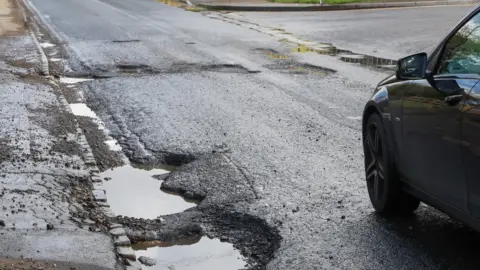Rishi Sunak sets out plan to tackle potholes
 Getty Images
Getty ImagesPrime Minister Rishi Sunak has set out how £8.3bn of promised funding will be used to tackle what he called the "scourge of potholes".
The PM announced the money last month as part of plans to scrap part of the HS2 high-speed rail line and spend the money on other projects.
The funding will go to England's local councils over the next 11 years for road maintenance.
Councils said the cost of repairing local roads was closer to £14bn.
The Local Government Association (LGA), which represents councils in England and Wales, said the money was "a significant boost" but it had consistently called for longer term funding to tackle the repair backlog.
Its spokesman, Darren Rodwell, said: "Longer-term, the government should award council highways departments with five yearly funding allocations to give more certainty, bringing councils on a par with National Highways so they can develop resurfacing programmes and other highways improvements, tackling the scourge of potholes."
The AA said call-outs to pothole-related breakdowns were at near-record levels, with more than 450,000 so far this year.
AA president Edmund King said the plan could make a "considerable difference in bringing our roads back to the standards which road users expect, especially if councils use the cash efficiently".
Simon Williams, head of policy at motoring organisation the RAC, said: "This should in time go a considerable way to bringing our roads back to a fit-for-purpose state and saving drivers hundreds of pounds in the process from not having to fork out for frustrating repairs to their vehicles."
In England, the North West, North East and Yorkshire and Humber will receive £3.3bn, with £2.2bn going to the West and East Midlands, and £2.8bn to the East, South East, South West and London.
Transport Secretary Mark Harper said it was up to local authorities how to spend their allocation, but part of the reason for the "significant increase" was so they could "improve the quality of road surfaces in the future" rather than just focusing on fixing existing potholes.
Mr Harper told BBC Breakfast that the cash would be used for "local road maintenance", which he said meant councils could use it to fill in specific potholes, but could also resurface areas with more defects.
"One things that actually often annoys drivers which is where they see one defect fixed and there are some other surrounding problems that are not fixed," he said.
"What this will actually enable councils to do is to have enough money that they can actually think about having a proper resurfacing programme, so if they have a road with a number of issues with it, rather than just fill say, a pothole, they can actually plan to resurface that area of road."
The Department for Transport said local authorities in England would get an extra £150m for road repairs this year, and the same amount for 2024 and 2025. The rest of the funding will be allocated over the next decade.
The department said the funding was on top of £5.5bn for local roads maintenance announced before plans to scrap HS2.
Local politicians, businesses and some senior Conservatives criticised the decision to scrap the Birmingham to Manchester leg of the high-speed line, arguing it would damage the economy.
Mr Sunak said: "For too long politicians have shied away from taking the right long-term decisions to make life easier for hardworking families - tackling the scourge of potholes being a prime example.
"This unprecedented £8.3bn investment will pave the road for better and safer journeys for millions of people across the country and put an end to the blight of nuisance potholes."
Data from the RAC suggests drivers are paying an average of £440 if their car needs fixing after hitting a pothole. The figure was for any damage more serious than a puncture.
Common vehicle problems caused by potholes include damaged shock absorbers, broken suspension springs and distorted wheels.

Have you got issues with potholes on your road? Share your experiences by emailing [email protected].
Please include a contact number if you are willing to speak to a BBC journalist. You can also get in touch in the following ways:
- WhatsApp: +44 7756 165803
- Tweet: @BBC_HaveYourSay
- Upload pictures or video
- Please read our terms & conditions and privacy policy
If you are reading this page and can't see the form you will need to visit the mobile version of the BBC website to submit your question or comment or you can email us at [email protected]. Please include your name, age and location with any submission.
